Leadership in Organisation: Experience, Concepts, and Theory Report
VerifiedAdded on 2023/01/16
|12
|3791
|97
Report
AI Summary
This report critically reflects on the author's leadership experiences within a business firm, identifying strengths and areas for development. The report details the application of leadership theories, including democratic, transactional, and strategic approaches, in achieving organizational goals and managing employees. It analyzes the use of leadership concepts, such as trait, behavioral, situational, and contingency theories, with a focus on Bill Gates' leadership at Microsoft. The report highlights the importance of communication, motivation, and decision-making skills in effective leadership, and it offers insights into personal development plans for enhancing leadership capabilities. The author faced various challenges, including resistance to change and the need for strategic planning, and used these experiences to improve their leadership approach. The conclusion emphasizes the significance of continuous improvement and strategic thinking in achieving organizational success.
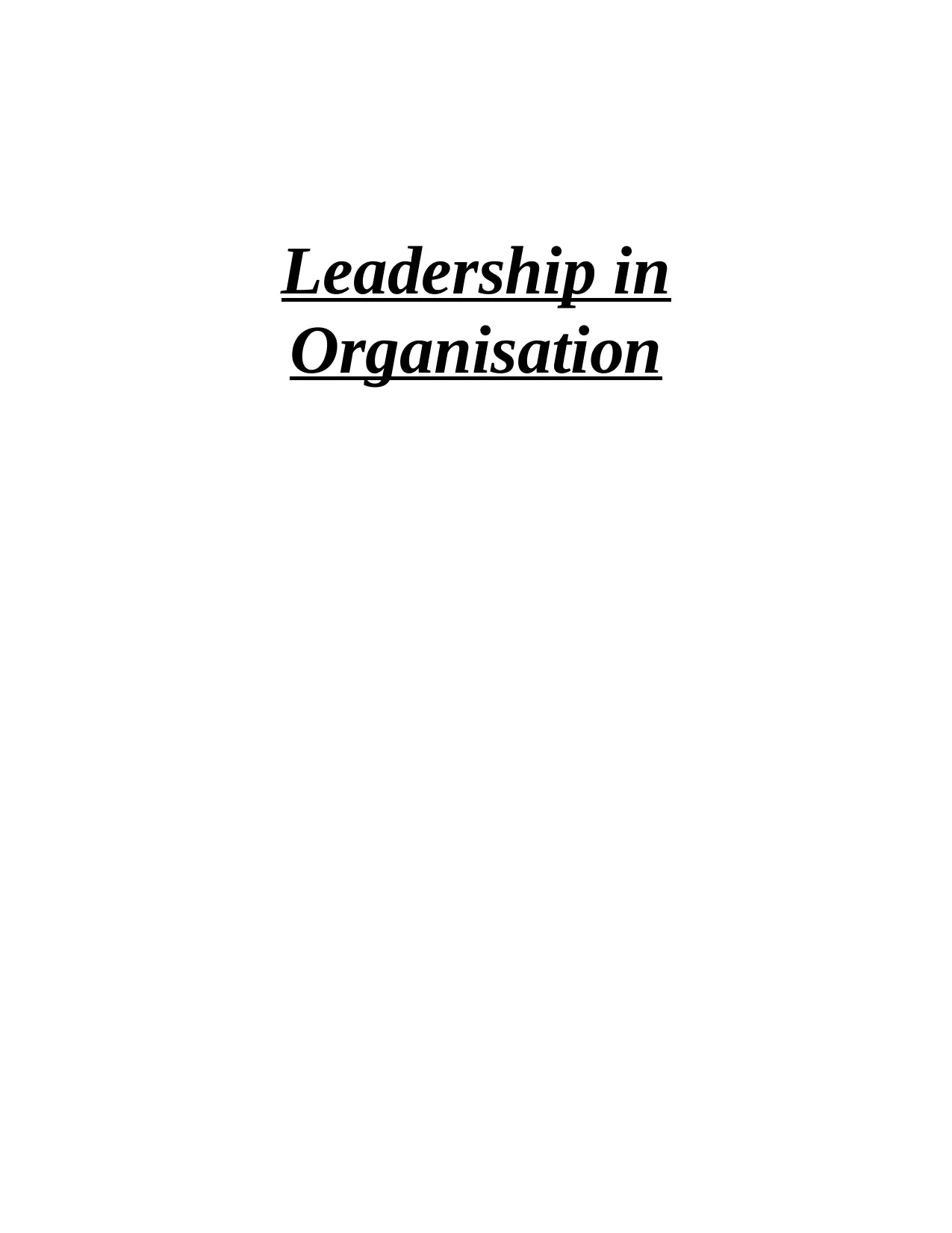
Leadership in
Organisation
Organisation
Paraphrase This Document
Need a fresh take? Get an instant paraphrase of this document with our AI Paraphraser
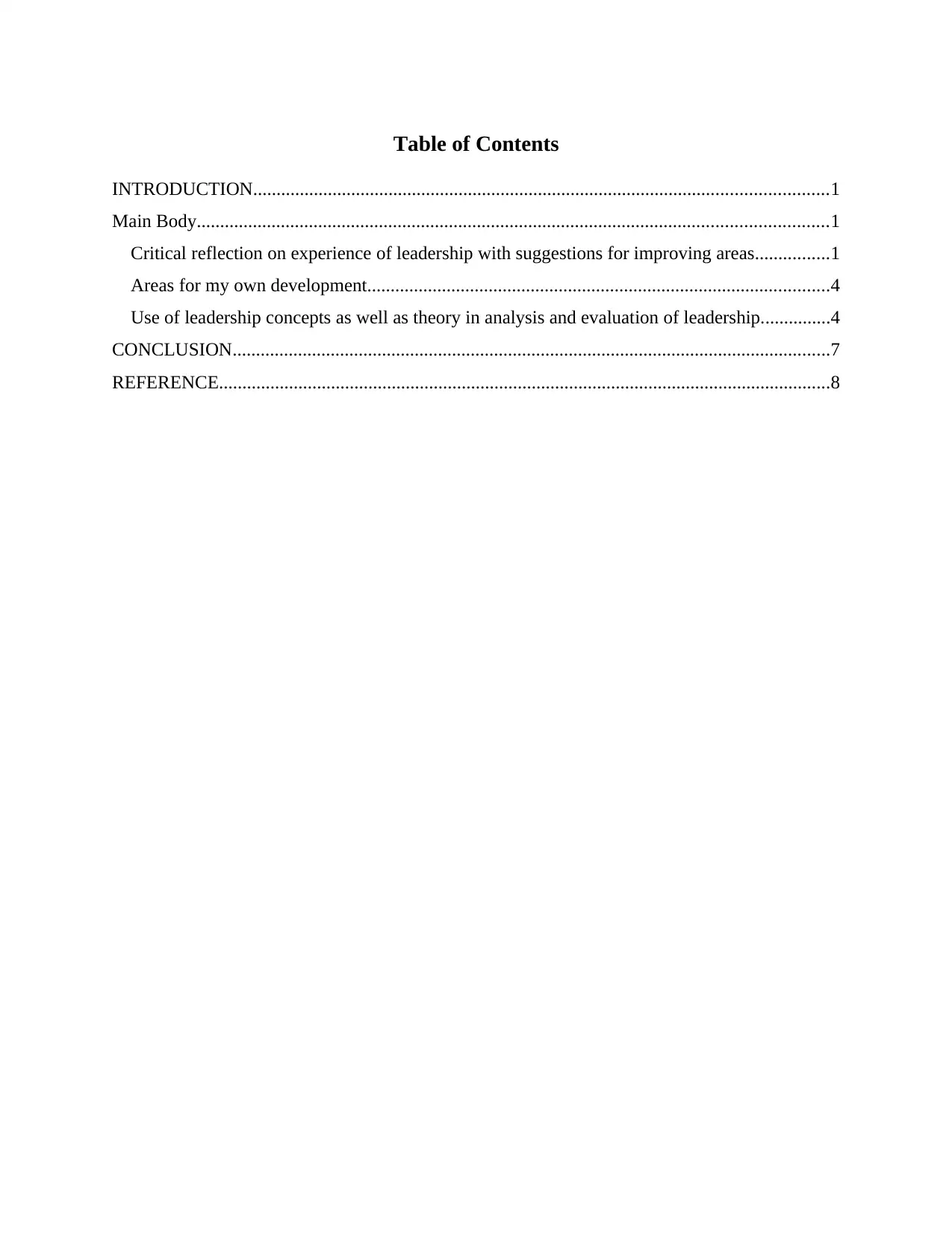
Table of Contents
INTRODUCTION...........................................................................................................................1
Main Body.......................................................................................................................................1
Critical reflection on experience of leadership with suggestions for improving areas................1
Areas for my own development...................................................................................................4
Use of leadership concepts as well as theory in analysis and evaluation of leadership...............4
CONCLUSION................................................................................................................................7
REFERENCE...................................................................................................................................8
INTRODUCTION...........................................................................................................................1
Main Body.......................................................................................................................................1
Critical reflection on experience of leadership with suggestions for improving areas................1
Areas for my own development...................................................................................................4
Use of leadership concepts as well as theory in analysis and evaluation of leadership...............4
CONCLUSION................................................................................................................................7
REFERENCE...................................................................................................................................8

⊘ This is a preview!⊘
Do you want full access?
Subscribe today to unlock all pages.

Trusted by 1+ million students worldwide
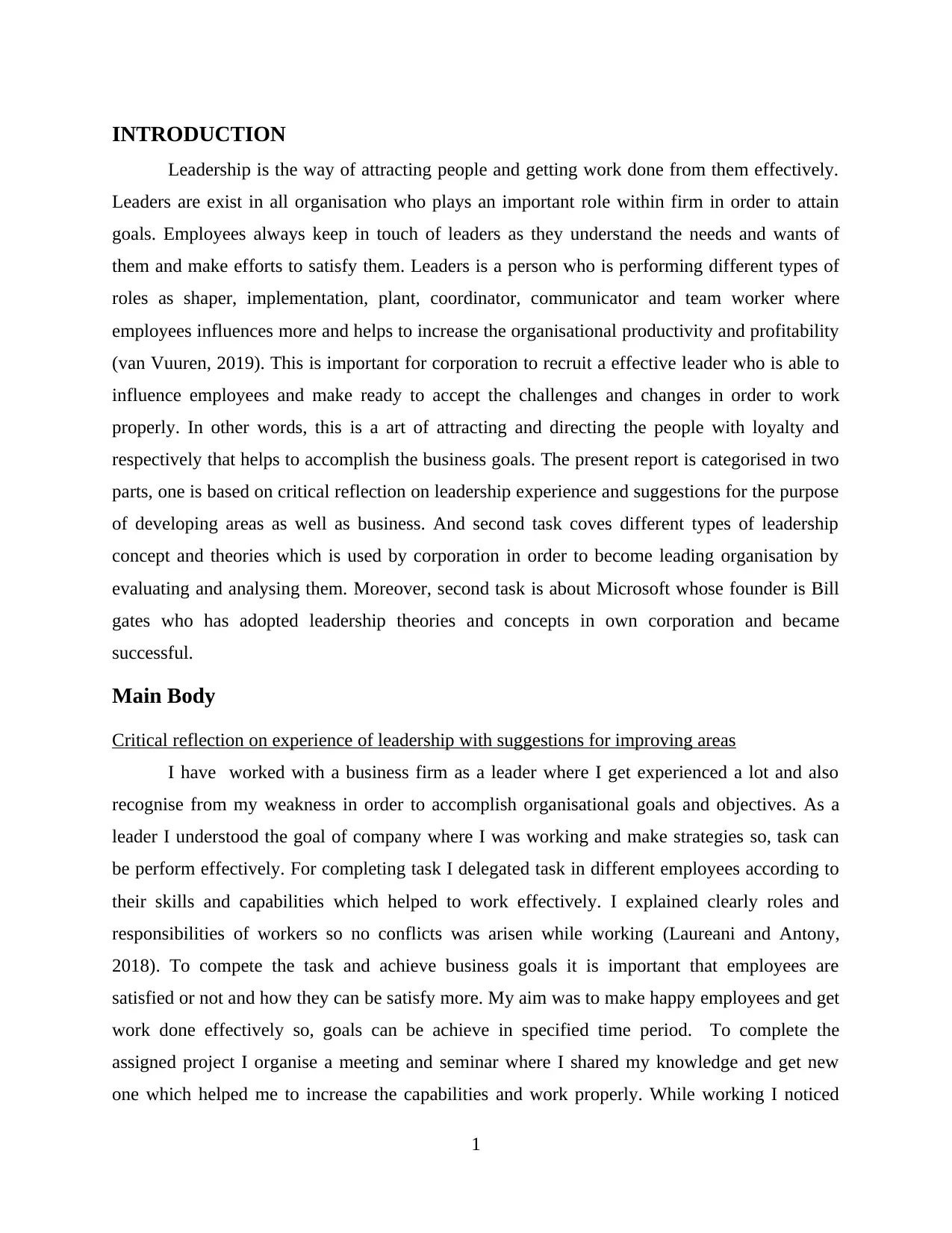
INTRODUCTION
Leadership is the way of attracting people and getting work done from them effectively.
Leaders are exist in all organisation who plays an important role within firm in order to attain
goals. Employees always keep in touch of leaders as they understand the needs and wants of
them and make efforts to satisfy them. Leaders is a person who is performing different types of
roles as shaper, implementation, plant, coordinator, communicator and team worker where
employees influences more and helps to increase the organisational productivity and profitability
(van Vuuren, 2019). This is important for corporation to recruit a effective leader who is able to
influence employees and make ready to accept the challenges and changes in order to work
properly. In other words, this is a art of attracting and directing the people with loyalty and
respectively that helps to accomplish the business goals. The present report is categorised in two
parts, one is based on critical reflection on leadership experience and suggestions for the purpose
of developing areas as well as business. And second task coves different types of leadership
concept and theories which is used by corporation in order to become leading organisation by
evaluating and analysing them. Moreover, second task is about Microsoft whose founder is Bill
gates who has adopted leadership theories and concepts in own corporation and became
successful.
Main Body
Critical reflection on experience of leadership with suggestions for improving areas
I have worked with a business firm as a leader where I get experienced a lot and also
recognise from my weakness in order to accomplish organisational goals and objectives. As a
leader I understood the goal of company where I was working and make strategies so, task can
be perform effectively. For completing task I delegated task in different employees according to
their skills and capabilities which helped to work effectively. I explained clearly roles and
responsibilities of workers so no conflicts was arisen while working (Laureani and Antony,
2018). To compete the task and achieve business goals it is important that employees are
satisfied or not and how they can be satisfy more. My aim was to make happy employees and get
work done effectively so, goals can be achieve in specified time period. To complete the
assigned project I organise a meeting and seminar where I shared my knowledge and get new
one which helped me to increase the capabilities and work properly. While working I noticed
1
Leadership is the way of attracting people and getting work done from them effectively.
Leaders are exist in all organisation who plays an important role within firm in order to attain
goals. Employees always keep in touch of leaders as they understand the needs and wants of
them and make efforts to satisfy them. Leaders is a person who is performing different types of
roles as shaper, implementation, plant, coordinator, communicator and team worker where
employees influences more and helps to increase the organisational productivity and profitability
(van Vuuren, 2019). This is important for corporation to recruit a effective leader who is able to
influence employees and make ready to accept the challenges and changes in order to work
properly. In other words, this is a art of attracting and directing the people with loyalty and
respectively that helps to accomplish the business goals. The present report is categorised in two
parts, one is based on critical reflection on leadership experience and suggestions for the purpose
of developing areas as well as business. And second task coves different types of leadership
concept and theories which is used by corporation in order to become leading organisation by
evaluating and analysing them. Moreover, second task is about Microsoft whose founder is Bill
gates who has adopted leadership theories and concepts in own corporation and became
successful.
Main Body
Critical reflection on experience of leadership with suggestions for improving areas
I have worked with a business firm as a leader where I get experienced a lot and also
recognise from my weakness in order to accomplish organisational goals and objectives. As a
leader I understood the goal of company where I was working and make strategies so, task can
be perform effectively. For completing task I delegated task in different employees according to
their skills and capabilities which helped to work effectively. I explained clearly roles and
responsibilities of workers so no conflicts was arisen while working (Laureani and Antony,
2018). To compete the task and achieve business goals it is important that employees are
satisfied or not and how they can be satisfy more. My aim was to make happy employees and get
work done effectively so, goals can be achieve in specified time period. To complete the
assigned project I organise a meeting and seminar where I shared my knowledge and get new
one which helped me to increase the capabilities and work properly. While working I noticed
1
Paraphrase This Document
Need a fresh take? Get an instant paraphrase of this document with our AI Paraphraser
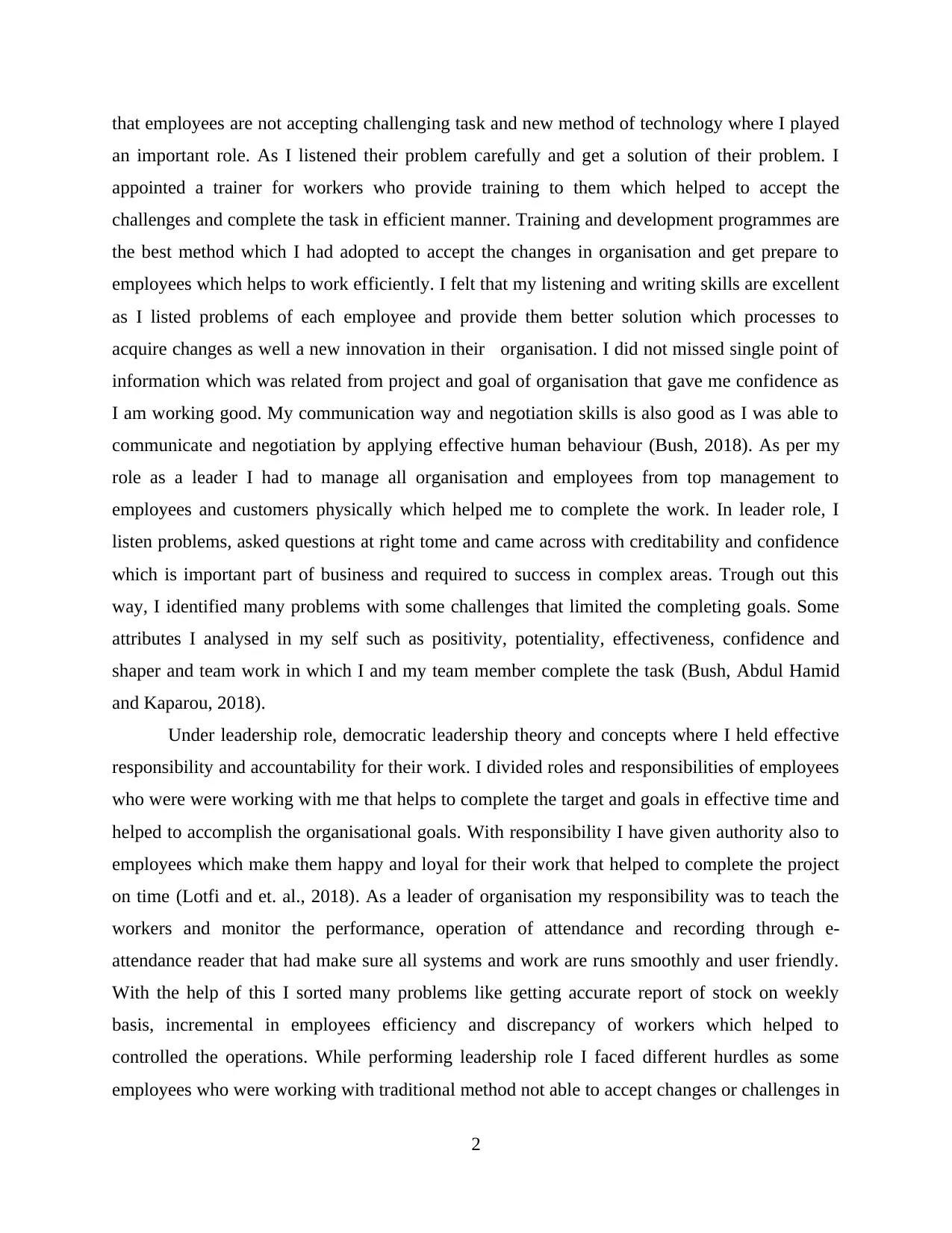
that employees are not accepting challenging task and new method of technology where I played
an important role. As I listened their problem carefully and get a solution of their problem. I
appointed a trainer for workers who provide training to them which helped to accept the
challenges and complete the task in efficient manner. Training and development programmes are
the best method which I had adopted to accept the changes in organisation and get prepare to
employees which helps to work efficiently. I felt that my listening and writing skills are excellent
as I listed problems of each employee and provide them better solution which processes to
acquire changes as well a new innovation in their organisation. I did not missed single point of
information which was related from project and goal of organisation that gave me confidence as
I am working good. My communication way and negotiation skills is also good as I was able to
communicate and negotiation by applying effective human behaviour (Bush, 2018). As per my
role as a leader I had to manage all organisation and employees from top management to
employees and customers physically which helped me to complete the work. In leader role, I
listen problems, asked questions at right tome and came across with creditability and confidence
which is important part of business and required to success in complex areas. Trough out this
way, I identified many problems with some challenges that limited the completing goals. Some
attributes I analysed in my self such as positivity, potentiality, effectiveness, confidence and
shaper and team work in which I and my team member complete the task (Bush, Abdul Hamid
and Kaparou, 2018).
Under leadership role, democratic leadership theory and concepts where I held effective
responsibility and accountability for their work. I divided roles and responsibilities of employees
who were were working with me that helps to complete the target and goals in effective time and
helped to accomplish the organisational goals. With responsibility I have given authority also to
employees which make them happy and loyal for their work that helped to complete the project
on time (Lotfi and et. al., 2018). As a leader of organisation my responsibility was to teach the
workers and monitor the performance, operation of attendance and recording through e-
attendance reader that had make sure all systems and work are runs smoothly and user friendly.
With the help of this I sorted many problems like getting accurate report of stock on weekly
basis, incremental in employees efficiency and discrepancy of workers which helped to
controlled the operations. While performing leadership role I faced different hurdles as some
employees who were working with traditional method not able to accept changes or challenges in
2
an important role. As I listened their problem carefully and get a solution of their problem. I
appointed a trainer for workers who provide training to them which helped to accept the
challenges and complete the task in efficient manner. Training and development programmes are
the best method which I had adopted to accept the changes in organisation and get prepare to
employees which helps to work efficiently. I felt that my listening and writing skills are excellent
as I listed problems of each employee and provide them better solution which processes to
acquire changes as well a new innovation in their organisation. I did not missed single point of
information which was related from project and goal of organisation that gave me confidence as
I am working good. My communication way and negotiation skills is also good as I was able to
communicate and negotiation by applying effective human behaviour (Bush, 2018). As per my
role as a leader I had to manage all organisation and employees from top management to
employees and customers physically which helped me to complete the work. In leader role, I
listen problems, asked questions at right tome and came across with creditability and confidence
which is important part of business and required to success in complex areas. Trough out this
way, I identified many problems with some challenges that limited the completing goals. Some
attributes I analysed in my self such as positivity, potentiality, effectiveness, confidence and
shaper and team work in which I and my team member complete the task (Bush, Abdul Hamid
and Kaparou, 2018).
Under leadership role, democratic leadership theory and concepts where I held effective
responsibility and accountability for their work. I divided roles and responsibilities of employees
who were were working with me that helps to complete the target and goals in effective time and
helped to accomplish the organisational goals. With responsibility I have given authority also to
employees which make them happy and loyal for their work that helped to complete the project
on time (Lotfi and et. al., 2018). As a leader of organisation my responsibility was to teach the
workers and monitor the performance, operation of attendance and recording through e-
attendance reader that had make sure all systems and work are runs smoothly and user friendly.
With the help of this I sorted many problems like getting accurate report of stock on weekly
basis, incremental in employees efficiency and discrepancy of workers which helped to
controlled the operations. While performing leadership role I faced different hurdles as some
employees who were working with traditional method not able to accept changes or challenges in
2
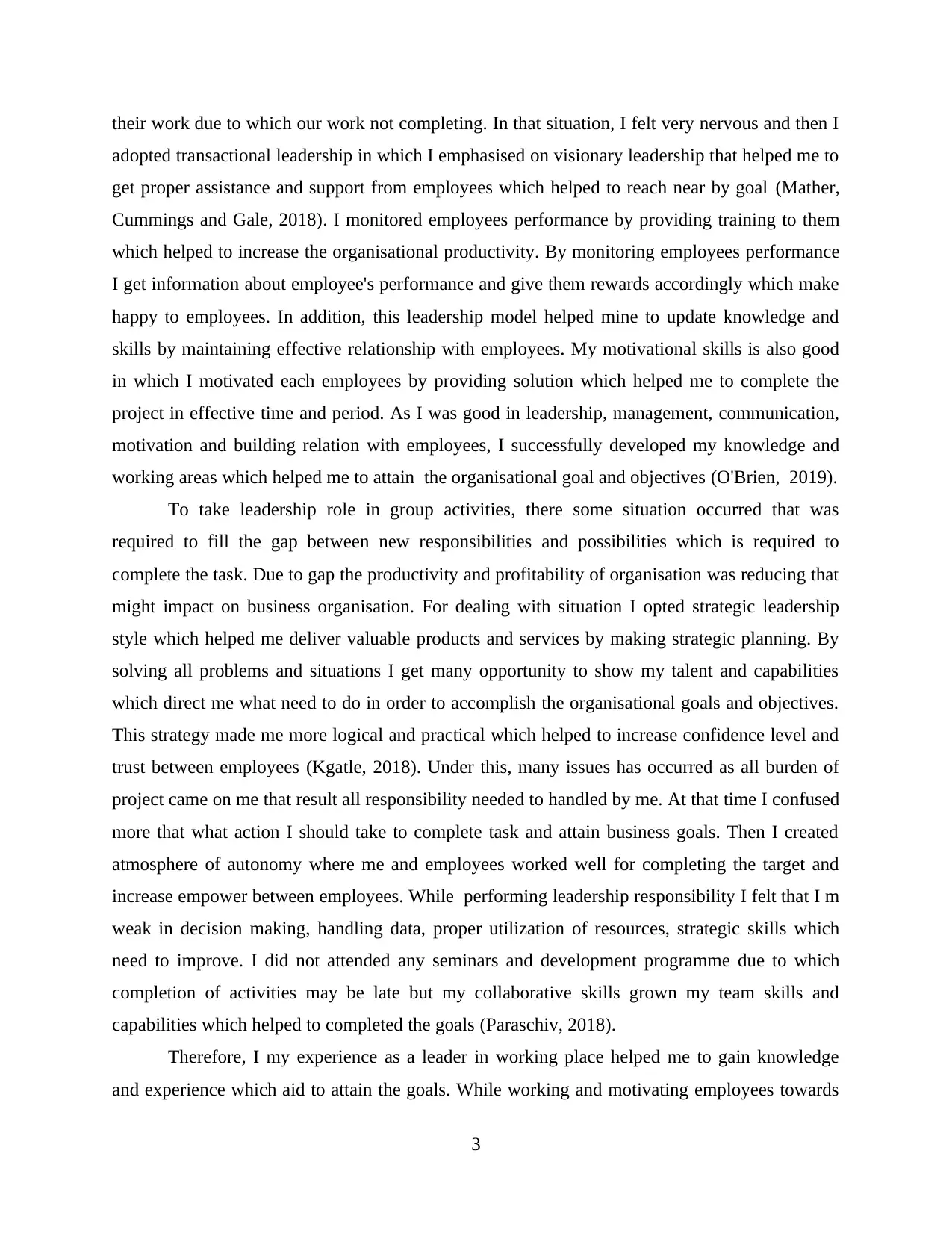
their work due to which our work not completing. In that situation, I felt very nervous and then I
adopted transactional leadership in which I emphasised on visionary leadership that helped me to
get proper assistance and support from employees which helped to reach near by goal (Mather,
Cummings and Gale, 2018). I monitored employees performance by providing training to them
which helped to increase the organisational productivity. By monitoring employees performance
I get information about employee's performance and give them rewards accordingly which make
happy to employees. In addition, this leadership model helped mine to update knowledge and
skills by maintaining effective relationship with employees. My motivational skills is also good
in which I motivated each employees by providing solution which helped me to complete the
project in effective time and period. As I was good in leadership, management, communication,
motivation and building relation with employees, I successfully developed my knowledge and
working areas which helped me to attain the organisational goal and objectives (O'Brien, 2019).
To take leadership role in group activities, there some situation occurred that was
required to fill the gap between new responsibilities and possibilities which is required to
complete the task. Due to gap the productivity and profitability of organisation was reducing that
might impact on business organisation. For dealing with situation I opted strategic leadership
style which helped me deliver valuable products and services by making strategic planning. By
solving all problems and situations I get many opportunity to show my talent and capabilities
which direct me what need to do in order to accomplish the organisational goals and objectives.
This strategy made me more logical and practical which helped to increase confidence level and
trust between employees (Kgatle, 2018). Under this, many issues has occurred as all burden of
project came on me that result all responsibility needed to handled by me. At that time I confused
more that what action I should take to complete task and attain business goals. Then I created
atmosphere of autonomy where me and employees worked well for completing the target and
increase empower between employees. While performing leadership responsibility I felt that I m
weak in decision making, handling data, proper utilization of resources, strategic skills which
need to improve. I did not attended any seminars and development programme due to which
completion of activities may be late but my collaborative skills grown my team skills and
capabilities which helped to completed the goals (Paraschiv, 2018).
Therefore, I my experience as a leader in working place helped me to gain knowledge
and experience which aid to attain the goals. While working and motivating employees towards
3
adopted transactional leadership in which I emphasised on visionary leadership that helped me to
get proper assistance and support from employees which helped to reach near by goal (Mather,
Cummings and Gale, 2018). I monitored employees performance by providing training to them
which helped to increase the organisational productivity. By monitoring employees performance
I get information about employee's performance and give them rewards accordingly which make
happy to employees. In addition, this leadership model helped mine to update knowledge and
skills by maintaining effective relationship with employees. My motivational skills is also good
in which I motivated each employees by providing solution which helped me to complete the
project in effective time and period. As I was good in leadership, management, communication,
motivation and building relation with employees, I successfully developed my knowledge and
working areas which helped me to attain the organisational goal and objectives (O'Brien, 2019).
To take leadership role in group activities, there some situation occurred that was
required to fill the gap between new responsibilities and possibilities which is required to
complete the task. Due to gap the productivity and profitability of organisation was reducing that
might impact on business organisation. For dealing with situation I opted strategic leadership
style which helped me deliver valuable products and services by making strategic planning. By
solving all problems and situations I get many opportunity to show my talent and capabilities
which direct me what need to do in order to accomplish the organisational goals and objectives.
This strategy made me more logical and practical which helped to increase confidence level and
trust between employees (Kgatle, 2018). Under this, many issues has occurred as all burden of
project came on me that result all responsibility needed to handled by me. At that time I confused
more that what action I should take to complete task and attain business goals. Then I created
atmosphere of autonomy where me and employees worked well for completing the target and
increase empower between employees. While performing leadership responsibility I felt that I m
weak in decision making, handling data, proper utilization of resources, strategic skills which
need to improve. I did not attended any seminars and development programme due to which
completion of activities may be late but my collaborative skills grown my team skills and
capabilities which helped to completed the goals (Paraschiv, 2018).
Therefore, I my experience as a leader in working place helped me to gain knowledge
and experience which aid to attain the goals. While working and motivating employees towards
3
⊘ This is a preview!⊘
Do you want full access?
Subscribe today to unlock all pages.

Trusted by 1+ million students worldwide
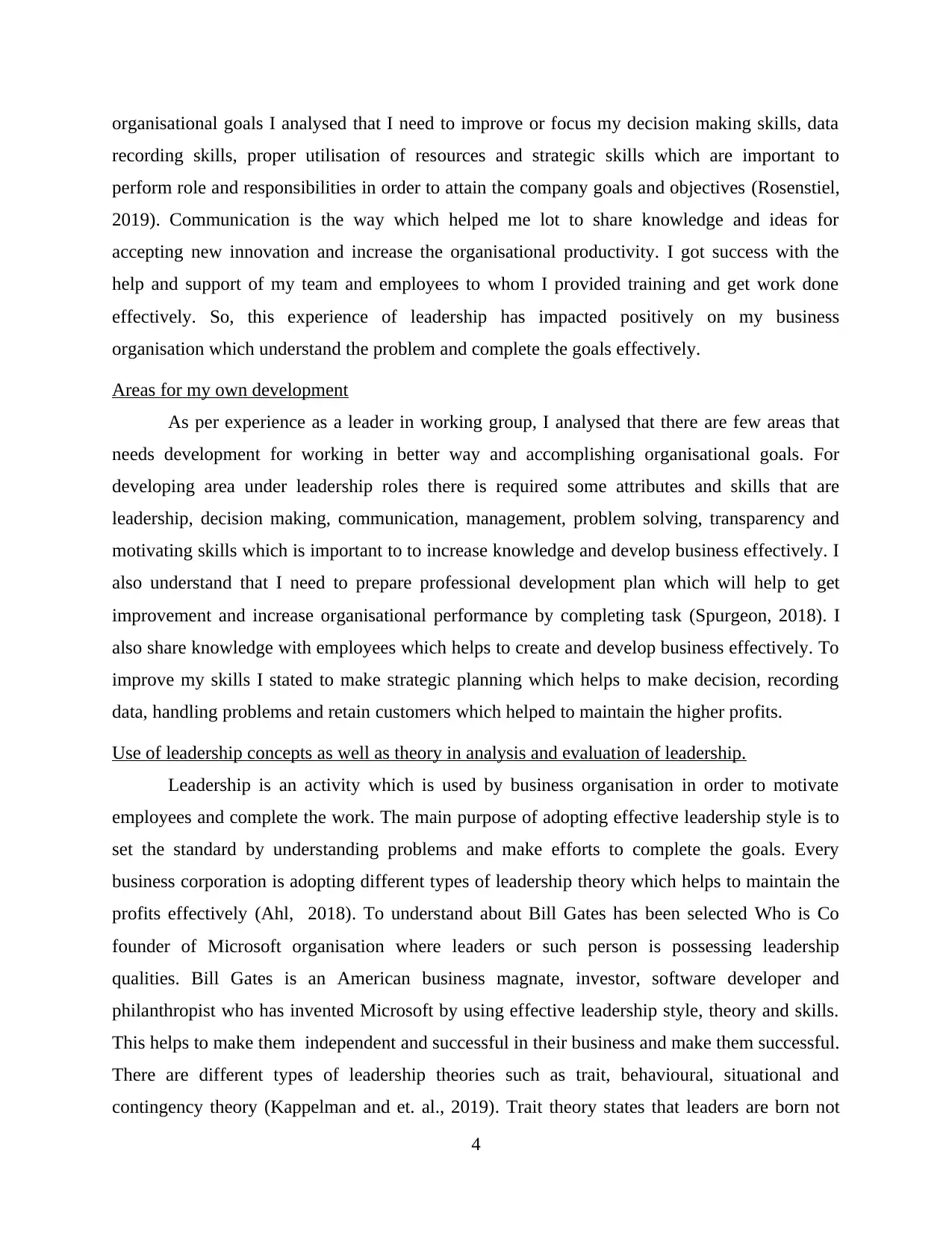
organisational goals I analysed that I need to improve or focus my decision making skills, data
recording skills, proper utilisation of resources and strategic skills which are important to
perform role and responsibilities in order to attain the company goals and objectives (Rosenstiel,
2019). Communication is the way which helped me lot to share knowledge and ideas for
accepting new innovation and increase the organisational productivity. I got success with the
help and support of my team and employees to whom I provided training and get work done
effectively. So, this experience of leadership has impacted positively on my business
organisation which understand the problem and complete the goals effectively.
Areas for my own development
As per experience as a leader in working group, I analysed that there are few areas that
needs development for working in better way and accomplishing organisational goals. For
developing area under leadership roles there is required some attributes and skills that are
leadership, decision making, communication, management, problem solving, transparency and
motivating skills which is important to to increase knowledge and develop business effectively. I
also understand that I need to prepare professional development plan which will help to get
improvement and increase organisational performance by completing task (Spurgeon, 2018). I
also share knowledge with employees which helps to create and develop business effectively. To
improve my skills I stated to make strategic planning which helps to make decision, recording
data, handling problems and retain customers which helped to maintain the higher profits.
Use of leadership concepts as well as theory in analysis and evaluation of leadership.
Leadership is an activity which is used by business organisation in order to motivate
employees and complete the work. The main purpose of adopting effective leadership style is to
set the standard by understanding problems and make efforts to complete the goals. Every
business corporation is adopting different types of leadership theory which helps to maintain the
profits effectively (Ahl, 2018). To understand about Bill Gates has been selected Who is Co
founder of Microsoft organisation where leaders or such person is possessing leadership
qualities. Bill Gates is an American business magnate, investor, software developer and
philanthropist who has invented Microsoft by using effective leadership style, theory and skills.
This helps to make them independent and successful in their business and make them successful.
There are different types of leadership theories such as trait, behavioural, situational and
contingency theory (Kappelman and et. al., 2019). Trait theory states that leaders are born not
4
recording skills, proper utilisation of resources and strategic skills which are important to
perform role and responsibilities in order to attain the company goals and objectives (Rosenstiel,
2019). Communication is the way which helped me lot to share knowledge and ideas for
accepting new innovation and increase the organisational productivity. I got success with the
help and support of my team and employees to whom I provided training and get work done
effectively. So, this experience of leadership has impacted positively on my business
organisation which understand the problem and complete the goals effectively.
Areas for my own development
As per experience as a leader in working group, I analysed that there are few areas that
needs development for working in better way and accomplishing organisational goals. For
developing area under leadership roles there is required some attributes and skills that are
leadership, decision making, communication, management, problem solving, transparency and
motivating skills which is important to to increase knowledge and develop business effectively. I
also understand that I need to prepare professional development plan which will help to get
improvement and increase organisational performance by completing task (Spurgeon, 2018). I
also share knowledge with employees which helps to create and develop business effectively. To
improve my skills I stated to make strategic planning which helps to make decision, recording
data, handling problems and retain customers which helped to maintain the higher profits.
Use of leadership concepts as well as theory in analysis and evaluation of leadership.
Leadership is an activity which is used by business organisation in order to motivate
employees and complete the work. The main purpose of adopting effective leadership style is to
set the standard by understanding problems and make efforts to complete the goals. Every
business corporation is adopting different types of leadership theory which helps to maintain the
profits effectively (Ahl, 2018). To understand about Bill Gates has been selected Who is Co
founder of Microsoft organisation where leaders or such person is possessing leadership
qualities. Bill Gates is an American business magnate, investor, software developer and
philanthropist who has invented Microsoft by using effective leadership style, theory and skills.
This helps to make them independent and successful in their business and make them successful.
There are different types of leadership theories such as trait, behavioural, situational and
contingency theory (Kappelman and et. al., 2019). Trait theory states that leaders are born not
4
Paraphrase This Document
Need a fresh take? Get an instant paraphrase of this document with our AI Paraphraser
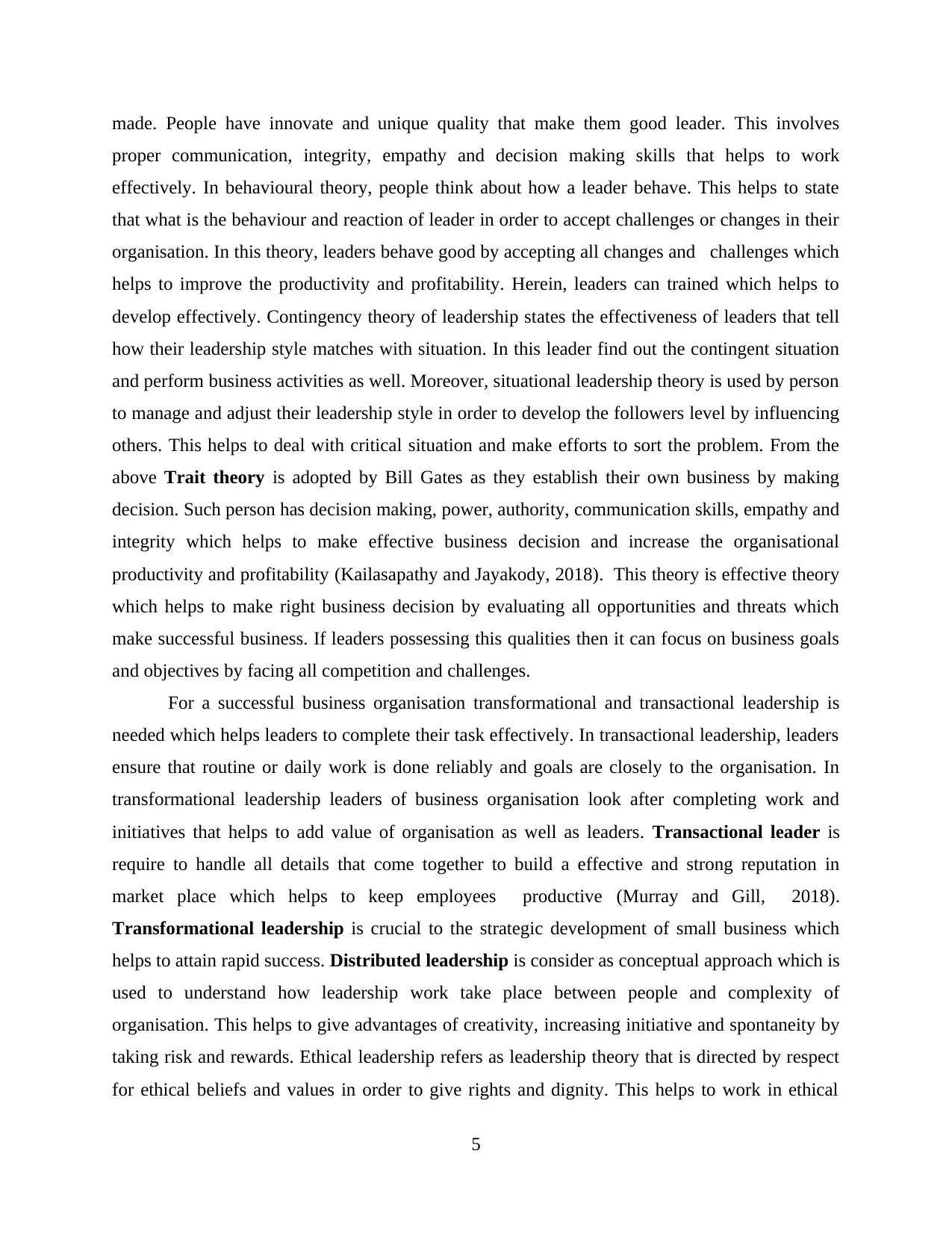
made. People have innovate and unique quality that make them good leader. This involves
proper communication, integrity, empathy and decision making skills that helps to work
effectively. In behavioural theory, people think about how a leader behave. This helps to state
that what is the behaviour and reaction of leader in order to accept challenges or changes in their
organisation. In this theory, leaders behave good by accepting all changes and challenges which
helps to improve the productivity and profitability. Herein, leaders can trained which helps to
develop effectively. Contingency theory of leadership states the effectiveness of leaders that tell
how their leadership style matches with situation. In this leader find out the contingent situation
and perform business activities as well. Moreover, situational leadership theory is used by person
to manage and adjust their leadership style in order to develop the followers level by influencing
others. This helps to deal with critical situation and make efforts to sort the problem. From the
above Trait theory is adopted by Bill Gates as they establish their own business by making
decision. Such person has decision making, power, authority, communication skills, empathy and
integrity which helps to make effective business decision and increase the organisational
productivity and profitability (Kailasapathy and Jayakody, 2018). This theory is effective theory
which helps to make right business decision by evaluating all opportunities and threats which
make successful business. If leaders possessing this qualities then it can focus on business goals
and objectives by facing all competition and challenges.
For a successful business organisation transformational and transactional leadership is
needed which helps leaders to complete their task effectively. In transactional leadership, leaders
ensure that routine or daily work is done reliably and goals are closely to the organisation. In
transformational leadership leaders of business organisation look after completing work and
initiatives that helps to add value of organisation as well as leaders. Transactional leader is
require to handle all details that come together to build a effective and strong reputation in
market place which helps to keep employees productive (Murray and Gill, 2018).
Transformational leadership is crucial to the strategic development of small business which
helps to attain rapid success. Distributed leadership is consider as conceptual approach which is
used to understand how leadership work take place between people and complexity of
organisation. This helps to give advantages of creativity, increasing initiative and spontaneity by
taking risk and rewards. Ethical leadership refers as leadership theory that is directed by respect
for ethical beliefs and values in order to give rights and dignity. This helps to work in ethical
5
proper communication, integrity, empathy and decision making skills that helps to work
effectively. In behavioural theory, people think about how a leader behave. This helps to state
that what is the behaviour and reaction of leader in order to accept challenges or changes in their
organisation. In this theory, leaders behave good by accepting all changes and challenges which
helps to improve the productivity and profitability. Herein, leaders can trained which helps to
develop effectively. Contingency theory of leadership states the effectiveness of leaders that tell
how their leadership style matches with situation. In this leader find out the contingent situation
and perform business activities as well. Moreover, situational leadership theory is used by person
to manage and adjust their leadership style in order to develop the followers level by influencing
others. This helps to deal with critical situation and make efforts to sort the problem. From the
above Trait theory is adopted by Bill Gates as they establish their own business by making
decision. Such person has decision making, power, authority, communication skills, empathy and
integrity which helps to make effective business decision and increase the organisational
productivity and profitability (Kailasapathy and Jayakody, 2018). This theory is effective theory
which helps to make right business decision by evaluating all opportunities and threats which
make successful business. If leaders possessing this qualities then it can focus on business goals
and objectives by facing all competition and challenges.
For a successful business organisation transformational and transactional leadership is
needed which helps leaders to complete their task effectively. In transactional leadership, leaders
ensure that routine or daily work is done reliably and goals are closely to the organisation. In
transformational leadership leaders of business organisation look after completing work and
initiatives that helps to add value of organisation as well as leaders. Transactional leader is
require to handle all details that come together to build a effective and strong reputation in
market place which helps to keep employees productive (Murray and Gill, 2018).
Transformational leadership is crucial to the strategic development of small business which
helps to attain rapid success. Distributed leadership is consider as conceptual approach which is
used to understand how leadership work take place between people and complexity of
organisation. This helps to give advantages of creativity, increasing initiative and spontaneity by
taking risk and rewards. Ethical leadership refers as leadership theory that is directed by respect
for ethical beliefs and values in order to give rights and dignity. This helps to work in ethical
5
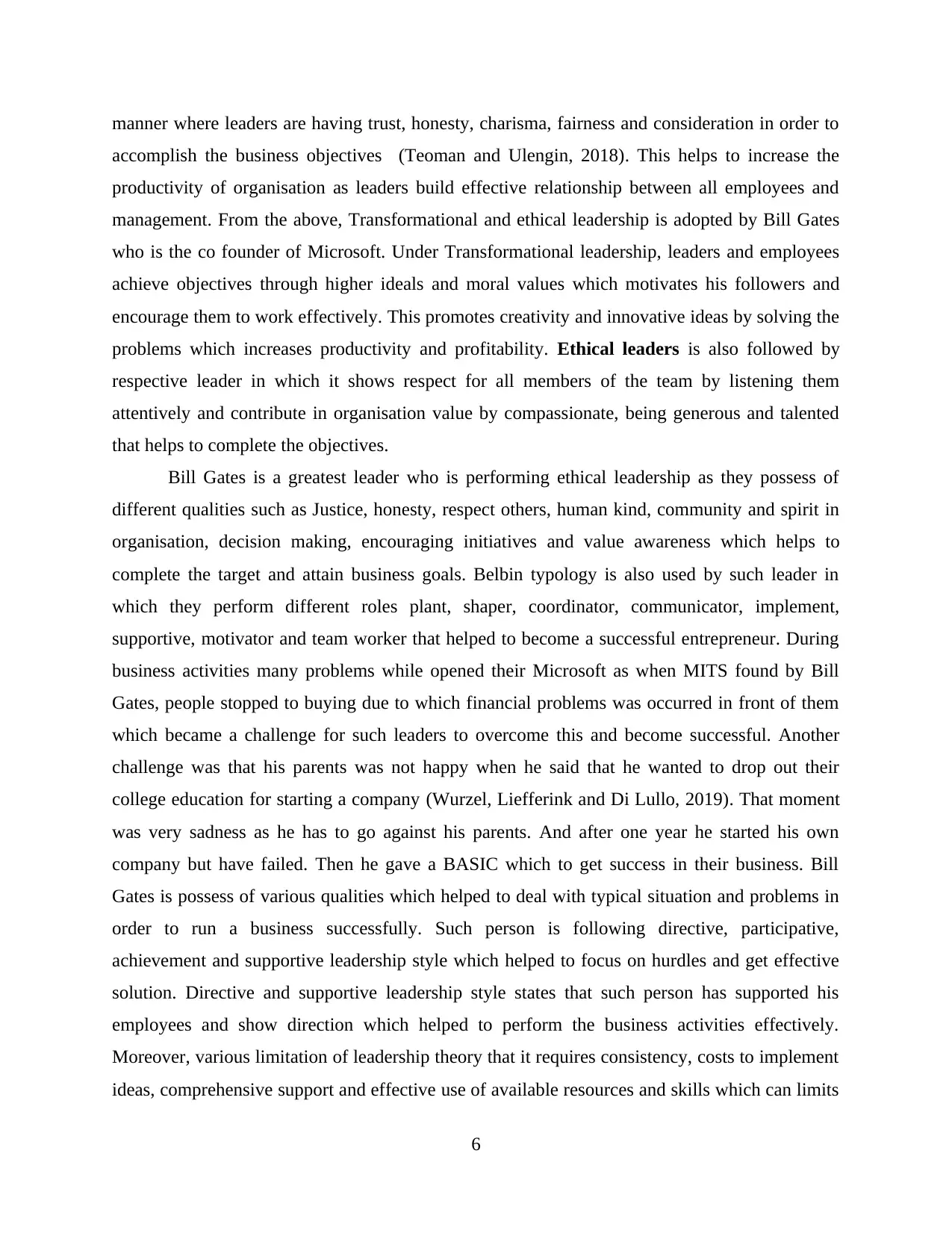
manner where leaders are having trust, honesty, charisma, fairness and consideration in order to
accomplish the business objectives (Teoman and Ulengin, 2018). This helps to increase the
productivity of organisation as leaders build effective relationship between all employees and
management. From the above, Transformational and ethical leadership is adopted by Bill Gates
who is the co founder of Microsoft. Under Transformational leadership, leaders and employees
achieve objectives through higher ideals and moral values which motivates his followers and
encourage them to work effectively. This promotes creativity and innovative ideas by solving the
problems which increases productivity and profitability. Ethical leaders is also followed by
respective leader in which it shows respect for all members of the team by listening them
attentively and contribute in organisation value by compassionate, being generous and talented
that helps to complete the objectives.
Bill Gates is a greatest leader who is performing ethical leadership as they possess of
different qualities such as Justice, honesty, respect others, human kind, community and spirit in
organisation, decision making, encouraging initiatives and value awareness which helps to
complete the target and attain business goals. Belbin typology is also used by such leader in
which they perform different roles plant, shaper, coordinator, communicator, implement,
supportive, motivator and team worker that helped to become a successful entrepreneur. During
business activities many problems while opened their Microsoft as when MITS found by Bill
Gates, people stopped to buying due to which financial problems was occurred in front of them
which became a challenge for such leaders to overcome this and become successful. Another
challenge was that his parents was not happy when he said that he wanted to drop out their
college education for starting a company (Wurzel, Liefferink and Di Lullo, 2019). That moment
was very sadness as he has to go against his parents. And after one year he started his own
company but have failed. Then he gave a BASIC which to get success in their business. Bill
Gates is possess of various qualities which helped to deal with typical situation and problems in
order to run a business successfully. Such person is following directive, participative,
achievement and supportive leadership style which helped to focus on hurdles and get effective
solution. Directive and supportive leadership style states that such person has supported his
employees and show direction which helped to perform the business activities effectively.
Moreover, various limitation of leadership theory that it requires consistency, costs to implement
ideas, comprehensive support and effective use of available resources and skills which can limits
6
accomplish the business objectives (Teoman and Ulengin, 2018). This helps to increase the
productivity of organisation as leaders build effective relationship between all employees and
management. From the above, Transformational and ethical leadership is adopted by Bill Gates
who is the co founder of Microsoft. Under Transformational leadership, leaders and employees
achieve objectives through higher ideals and moral values which motivates his followers and
encourage them to work effectively. This promotes creativity and innovative ideas by solving the
problems which increases productivity and profitability. Ethical leaders is also followed by
respective leader in which it shows respect for all members of the team by listening them
attentively and contribute in organisation value by compassionate, being generous and talented
that helps to complete the objectives.
Bill Gates is a greatest leader who is performing ethical leadership as they possess of
different qualities such as Justice, honesty, respect others, human kind, community and spirit in
organisation, decision making, encouraging initiatives and value awareness which helps to
complete the target and attain business goals. Belbin typology is also used by such leader in
which they perform different roles plant, shaper, coordinator, communicator, implement,
supportive, motivator and team worker that helped to become a successful entrepreneur. During
business activities many problems while opened their Microsoft as when MITS found by Bill
Gates, people stopped to buying due to which financial problems was occurred in front of them
which became a challenge for such leaders to overcome this and become successful. Another
challenge was that his parents was not happy when he said that he wanted to drop out their
college education for starting a company (Wurzel, Liefferink and Di Lullo, 2019). That moment
was very sadness as he has to go against his parents. And after one year he started his own
company but have failed. Then he gave a BASIC which to get success in their business. Bill
Gates is possess of various qualities which helped to deal with typical situation and problems in
order to run a business successfully. Such person is following directive, participative,
achievement and supportive leadership style which helped to focus on hurdles and get effective
solution. Directive and supportive leadership style states that such person has supported his
employees and show direction which helped to perform the business activities effectively.
Moreover, various limitation of leadership theory that it requires consistency, costs to implement
ideas, comprehensive support and effective use of available resources and skills which can limits
6
⊘ This is a preview!⊘
Do you want full access?
Subscribe today to unlock all pages.

Trusted by 1+ million students worldwide
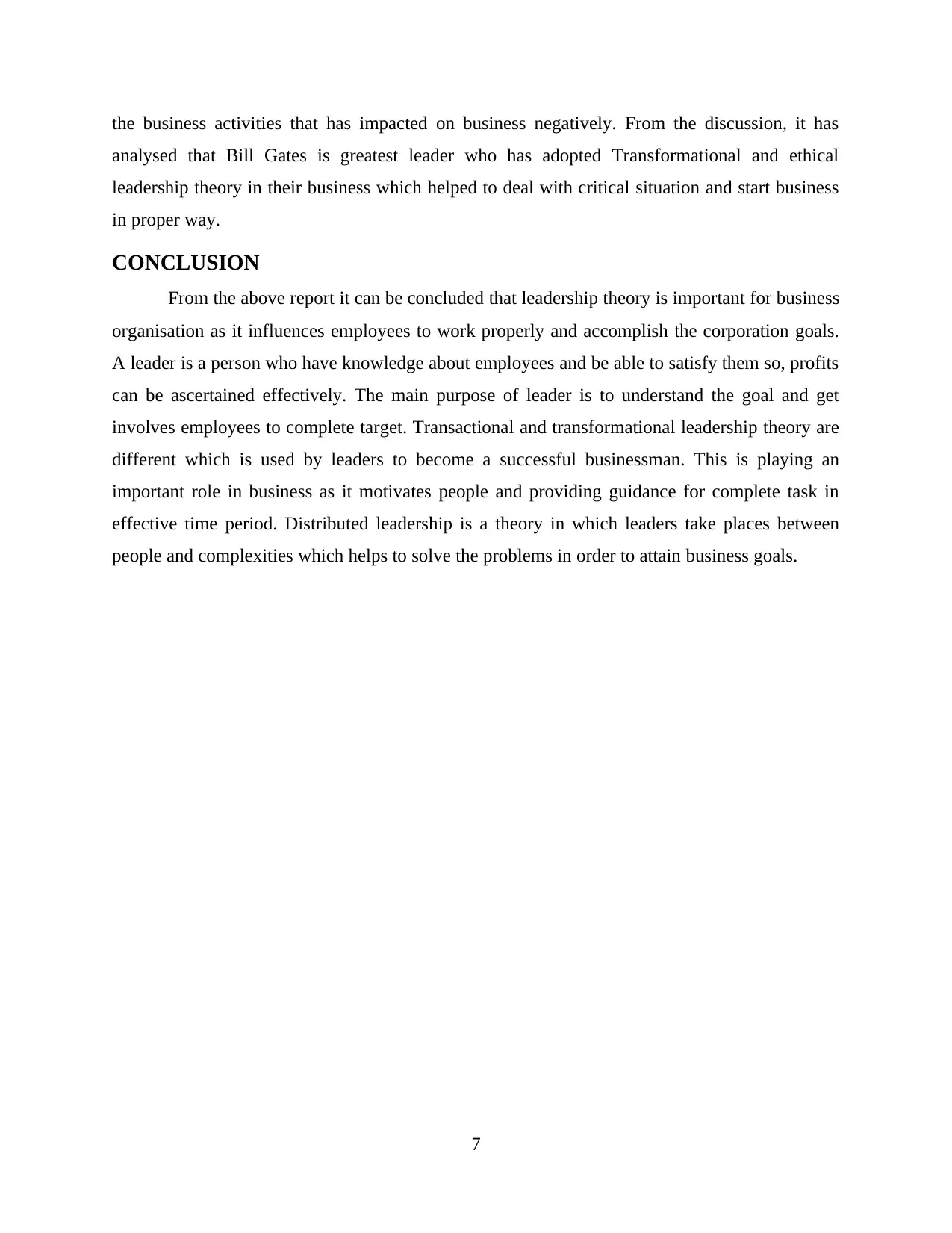
the business activities that has impacted on business negatively. From the discussion, it has
analysed that Bill Gates is greatest leader who has adopted Transformational and ethical
leadership theory in their business which helped to deal with critical situation and start business
in proper way.
CONCLUSION
From the above report it can be concluded that leadership theory is important for business
organisation as it influences employees to work properly and accomplish the corporation goals.
A leader is a person who have knowledge about employees and be able to satisfy them so, profits
can be ascertained effectively. The main purpose of leader is to understand the goal and get
involves employees to complete target. Transactional and transformational leadership theory are
different which is used by leaders to become a successful businessman. This is playing an
important role in business as it motivates people and providing guidance for complete task in
effective time period. Distributed leadership is a theory in which leaders take places between
people and complexities which helps to solve the problems in order to attain business goals.
7
analysed that Bill Gates is greatest leader who has adopted Transformational and ethical
leadership theory in their business which helped to deal with critical situation and start business
in proper way.
CONCLUSION
From the above report it can be concluded that leadership theory is important for business
organisation as it influences employees to work properly and accomplish the corporation goals.
A leader is a person who have knowledge about employees and be able to satisfy them so, profits
can be ascertained effectively. The main purpose of leader is to understand the goal and get
involves employees to complete target. Transactional and transformational leadership theory are
different which is used by leaders to become a successful businessman. This is playing an
important role in business as it motivates people and providing guidance for complete task in
effective time period. Distributed leadership is a theory in which leaders take places between
people and complexities which helps to solve the problems in order to attain business goals.
7
Paraphrase This Document
Need a fresh take? Get an instant paraphrase of this document with our AI Paraphraser
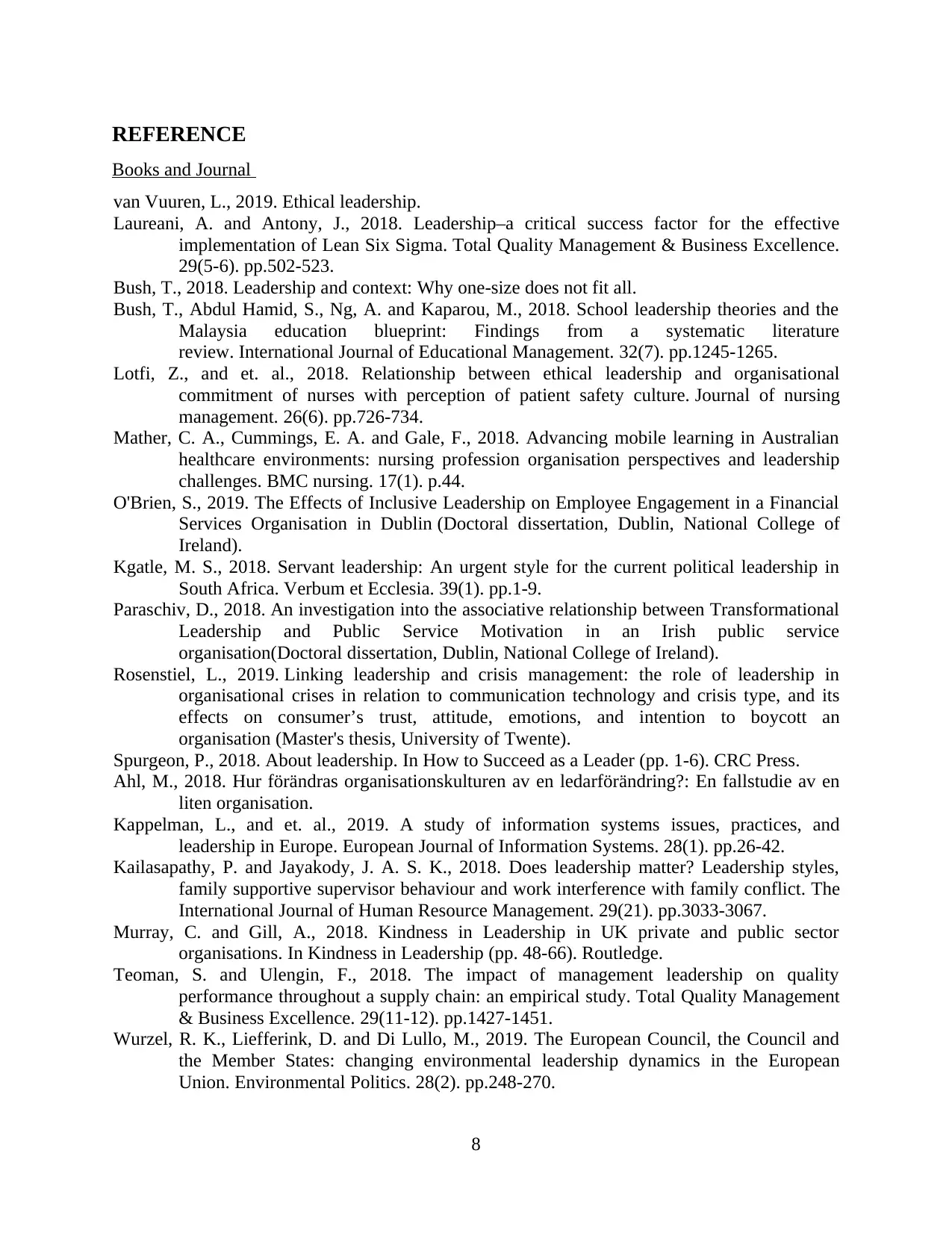
REFERENCE
Books and Journal
van Vuuren, L., 2019. Ethical leadership.
Laureani, A. and Antony, J., 2018. Leadership–a critical success factor for the effective
implementation of Lean Six Sigma. Total Quality Management & Business Excellence.
29(5-6). pp.502-523.
Bush, T., 2018. Leadership and context: Why one-size does not fit all.
Bush, T., Abdul Hamid, S., Ng, A. and Kaparou, M., 2018. School leadership theories and the
Malaysia education blueprint: Findings from a systematic literature
review. International Journal of Educational Management. 32(7). pp.1245-1265.
Lotfi, Z., and et. al., 2018. Relationship between ethical leadership and organisational
commitment of nurses with perception of patient safety culture. Journal of nursing
management. 26(6). pp.726-734.
Mather, C. A., Cummings, E. A. and Gale, F., 2018. Advancing mobile learning in Australian
healthcare environments: nursing profession organisation perspectives and leadership
challenges. BMC nursing. 17(1). p.44.
O'Brien, S., 2019. The Effects of Inclusive Leadership on Employee Engagement in a Financial
Services Organisation in Dublin (Doctoral dissertation, Dublin, National College of
Ireland).
Kgatle, M. S., 2018. Servant leadership: An urgent style for the current political leadership in
South Africa. Verbum et Ecclesia. 39(1). pp.1-9.
Paraschiv, D., 2018. An investigation into the associative relationship between Transformational
Leadership and Public Service Motivation in an Irish public service
organisation(Doctoral dissertation, Dublin, National College of Ireland).
Rosenstiel, L., 2019. Linking leadership and crisis management: the role of leadership in
organisational crises in relation to communication technology and crisis type, and its
effects on consumer’s trust, attitude, emotions, and intention to boycott an
organisation (Master's thesis, University of Twente).
Spurgeon, P., 2018. About leadership. In How to Succeed as a Leader (pp. 1-6). CRC Press.
Ahl, M., 2018. Hur förändras organisationskulturen av en ledarförändring?: En fallstudie av en
liten organisation.
Kappelman, L., and et. al., 2019. A study of information systems issues, practices, and
leadership in Europe. European Journal of Information Systems. 28(1). pp.26-42.
Kailasapathy, P. and Jayakody, J. A. S. K., 2018. Does leadership matter? Leadership styles,
family supportive supervisor behaviour and work interference with family conflict. The
International Journal of Human Resource Management. 29(21). pp.3033-3067.
Murray, C. and Gill, A., 2018. Kindness in Leadership in UK private and public sector
organisations. In Kindness in Leadership (pp. 48-66). Routledge.
Teoman, S. and Ulengin, F., 2018. The impact of management leadership on quality
performance throughout a supply chain: an empirical study. Total Quality Management
& Business Excellence. 29(11-12). pp.1427-1451.
Wurzel, R. K., Liefferink, D. and Di Lullo, M., 2019. The European Council, the Council and
the Member States: changing environmental leadership dynamics in the European
Union. Environmental Politics. 28(2). pp.248-270.
8
Books and Journal
van Vuuren, L., 2019. Ethical leadership.
Laureani, A. and Antony, J., 2018. Leadership–a critical success factor for the effective
implementation of Lean Six Sigma. Total Quality Management & Business Excellence.
29(5-6). pp.502-523.
Bush, T., 2018. Leadership and context: Why one-size does not fit all.
Bush, T., Abdul Hamid, S., Ng, A. and Kaparou, M., 2018. School leadership theories and the
Malaysia education blueprint: Findings from a systematic literature
review. International Journal of Educational Management. 32(7). pp.1245-1265.
Lotfi, Z., and et. al., 2018. Relationship between ethical leadership and organisational
commitment of nurses with perception of patient safety culture. Journal of nursing
management. 26(6). pp.726-734.
Mather, C. A., Cummings, E. A. and Gale, F., 2018. Advancing mobile learning in Australian
healthcare environments: nursing profession organisation perspectives and leadership
challenges. BMC nursing. 17(1). p.44.
O'Brien, S., 2019. The Effects of Inclusive Leadership on Employee Engagement in a Financial
Services Organisation in Dublin (Doctoral dissertation, Dublin, National College of
Ireland).
Kgatle, M. S., 2018. Servant leadership: An urgent style for the current political leadership in
South Africa. Verbum et Ecclesia. 39(1). pp.1-9.
Paraschiv, D., 2018. An investigation into the associative relationship between Transformational
Leadership and Public Service Motivation in an Irish public service
organisation(Doctoral dissertation, Dublin, National College of Ireland).
Rosenstiel, L., 2019. Linking leadership and crisis management: the role of leadership in
organisational crises in relation to communication technology and crisis type, and its
effects on consumer’s trust, attitude, emotions, and intention to boycott an
organisation (Master's thesis, University of Twente).
Spurgeon, P., 2018. About leadership. In How to Succeed as a Leader (pp. 1-6). CRC Press.
Ahl, M., 2018. Hur förändras organisationskulturen av en ledarförändring?: En fallstudie av en
liten organisation.
Kappelman, L., and et. al., 2019. A study of information systems issues, practices, and
leadership in Europe. European Journal of Information Systems. 28(1). pp.26-42.
Kailasapathy, P. and Jayakody, J. A. S. K., 2018. Does leadership matter? Leadership styles,
family supportive supervisor behaviour and work interference with family conflict. The
International Journal of Human Resource Management. 29(21). pp.3033-3067.
Murray, C. and Gill, A., 2018. Kindness in Leadership in UK private and public sector
organisations. In Kindness in Leadership (pp. 48-66). Routledge.
Teoman, S. and Ulengin, F., 2018. The impact of management leadership on quality
performance throughout a supply chain: an empirical study. Total Quality Management
& Business Excellence. 29(11-12). pp.1427-1451.
Wurzel, R. K., Liefferink, D. and Di Lullo, M., 2019. The European Council, the Council and
the Member States: changing environmental leadership dynamics in the European
Union. Environmental Politics. 28(2). pp.248-270.
8
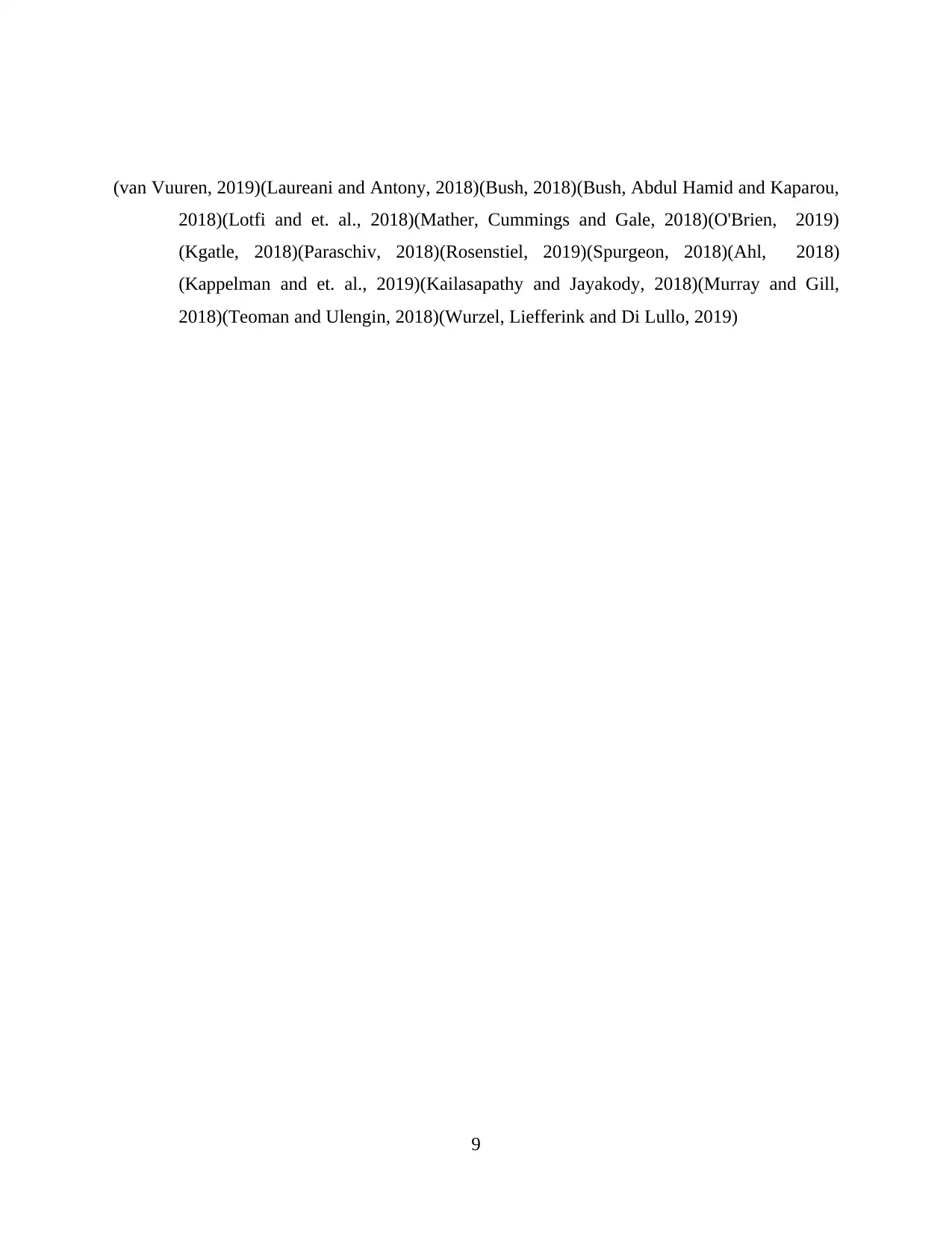
(van Vuuren, 2019)(Laureani and Antony, 2018)(Bush, 2018)(Bush, Abdul Hamid and Kaparou,
2018)(Lotfi and et. al., 2018)(Mather, Cummings and Gale, 2018)(O'Brien, 2019)
(Kgatle, 2018)(Paraschiv, 2018)(Rosenstiel, 2019)(Spurgeon, 2018)(Ahl, 2018)
(Kappelman and et. al., 2019)(Kailasapathy and Jayakody, 2018)(Murray and Gill,
2018)(Teoman and Ulengin, 2018)(Wurzel, Liefferink and Di Lullo, 2019)
9
2018)(Lotfi and et. al., 2018)(Mather, Cummings and Gale, 2018)(O'Brien, 2019)
(Kgatle, 2018)(Paraschiv, 2018)(Rosenstiel, 2019)(Spurgeon, 2018)(Ahl, 2018)
(Kappelman and et. al., 2019)(Kailasapathy and Jayakody, 2018)(Murray and Gill,
2018)(Teoman and Ulengin, 2018)(Wurzel, Liefferink and Di Lullo, 2019)
9
⊘ This is a preview!⊘
Do you want full access?
Subscribe today to unlock all pages.

Trusted by 1+ million students worldwide
1 out of 12
Related Documents
Your All-in-One AI-Powered Toolkit for Academic Success.
+13062052269
info@desklib.com
Available 24*7 on WhatsApp / Email
![[object Object]](/_next/static/media/star-bottom.7253800d.svg)
Unlock your academic potential
Copyright © 2020–2026 A2Z Services. All Rights Reserved. Developed and managed by ZUCOL.





